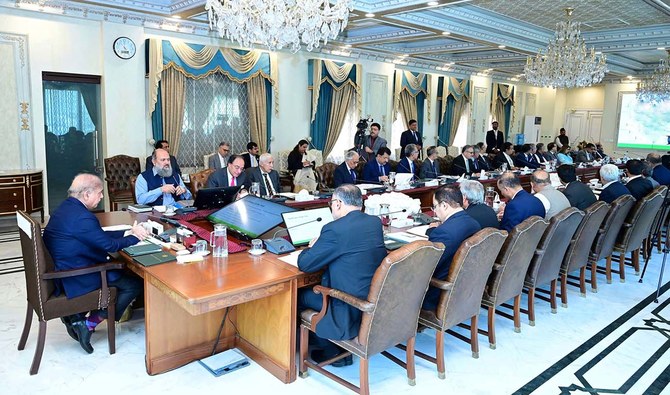ISLAMABAD: Former Pakistan prime minister Imran Khan will not directly face the public under a new security plan for his protest march to Islamabad, an official of Khan’s party said on Friday, a week after the ex-premier was wounded in a gun attack in Wazirabad city.
Khan started his motorized march toward Islamabad from Lahore late last month to force PM Shehbaz Sharif-led coalition government to announce early elections.
However, the march was postponed for a week after Khan’s convoy was sprayed with bullets in Wazirabad, a city some 100 kilometers from Lahore, leaving one person dead and Khan among ten others wounded.
Khan’s Pakistan Tehreek-e-Insaf (PTI) party resumed the march with renewed security measures on Thursday as the former premier continues to recover at home, after being initially treated at Shaukat Khanum Hospital in Lahore.
“We are not going to compromise on Imran Khan’s security,” Mussarat Jamshed Cheema, a member of Khan’s party as well as a spokesperson for the Punjab government, exclusively told Arab News on Friday.
“From now onwards, he won’t have any direct exposure to the public in the long march.”
Khan’s party has acquired a new bulletproof container with a bulletproof glass podium atop to safeguard party leaders while traveling and addressing supporters on their way to Islamabad.
“We are ensuring multi-layered, fool-proof security, what is humanly possible to protect not only our leaders but also the participants of the march from any untoward incident,” Cheema said.
Khan will be addressing supporters through a video link from his residence until the protest caravans reach Rawalpindi later this month, according to his party.
The former premier, who was ousted in a no-confidence vote by parliament in April, has since been agitating against the government, whom he accuses of siding with foreign powers to remove him from office.
The former premier will be leading the march from Rawalpindi to Islamabad in a bullet-proof vehicle with “zero public exposure,” Cheema said.
“We are forced to do this due to threats to Khan’s life,” she added.
Before the attack on November 3, TV footage and videos shared online showed people welcoming Khan from their rooftops and overhead bridges, some even shaking hands with the former premier as his container truck passed underneath a flyover.
Cheema said, the container truck, currently led by Shah Mahmood Qureshi and others, would now be making its way to the capital within a security cordon of the Punjab police, unlike the past when party volunteers were acting as the first line of defense around it.
“Even top party leaders would not be allowed to ride the container truck without prior permission,” she said.
“We don’t want to see any recurrence of the Wazirabad-like incident.”
When asked about the number of Punjab police and other security personnel deployed for the march, Cheema declined to divulge details due to “security reasons.”
PM Sharif’s government on Thursday issued a summary of expenses it had been bearing to provide security to Khan.
It said it was spending Rs21.9 million ($101,126) monthly and Rs263 million ($1.2 million) annually to ensure safety of the former premier.
Also on Friday, the Punjab provincial government, where Khan and his allies are in power, constituted a five-member joint investigation team (JIT) to probe the November 3 shooting, though its timeline for the completion of the probe has yet to be decided.
Tariq Rustam Chohan, the Lahore police chief, is the convener of the team, which includes no official of the military-led Inter-Services Intelligence (ISI) and the federal Intelligence Bureau (IB) agencies, according to a Home Department notification.
The Punjab police, after much delay, registered a first information report (FIR) of the incident on November 7, on the directives of the Supreme Court.
Khan had nominated PM Sharif, Interior Minister Rana Sanaullah and ISI’s Maj. Gen. Faisal Naseer in his complaint to the police, but the FIR did not mention them as suspects.
“The investigation into the incident was unfortunately on hold due to unnecessary delay in the registration of the FIR, but now it will be expedited and proceeded as per the law,” Cheema said.
Khan, once widely believed to have been supported by Pakistan’s powerful military establishment, is now considered to have fallen out with the army since his ouster.
The former premier as well as members and supporters of his party have been criticizing the military for not intervening to block his ouster, which he says was part of a United States-backed “foreign conspiracy.” Washington and Khan’s opponents deny the allegation.
“The timeline of the investigation will be decided in the next meeting [of home department officials],” Cheema added.
“Obviously, this investigation is going to be time-bound and with a clear mandate to reach to the bottom of this shooting incident.”
















